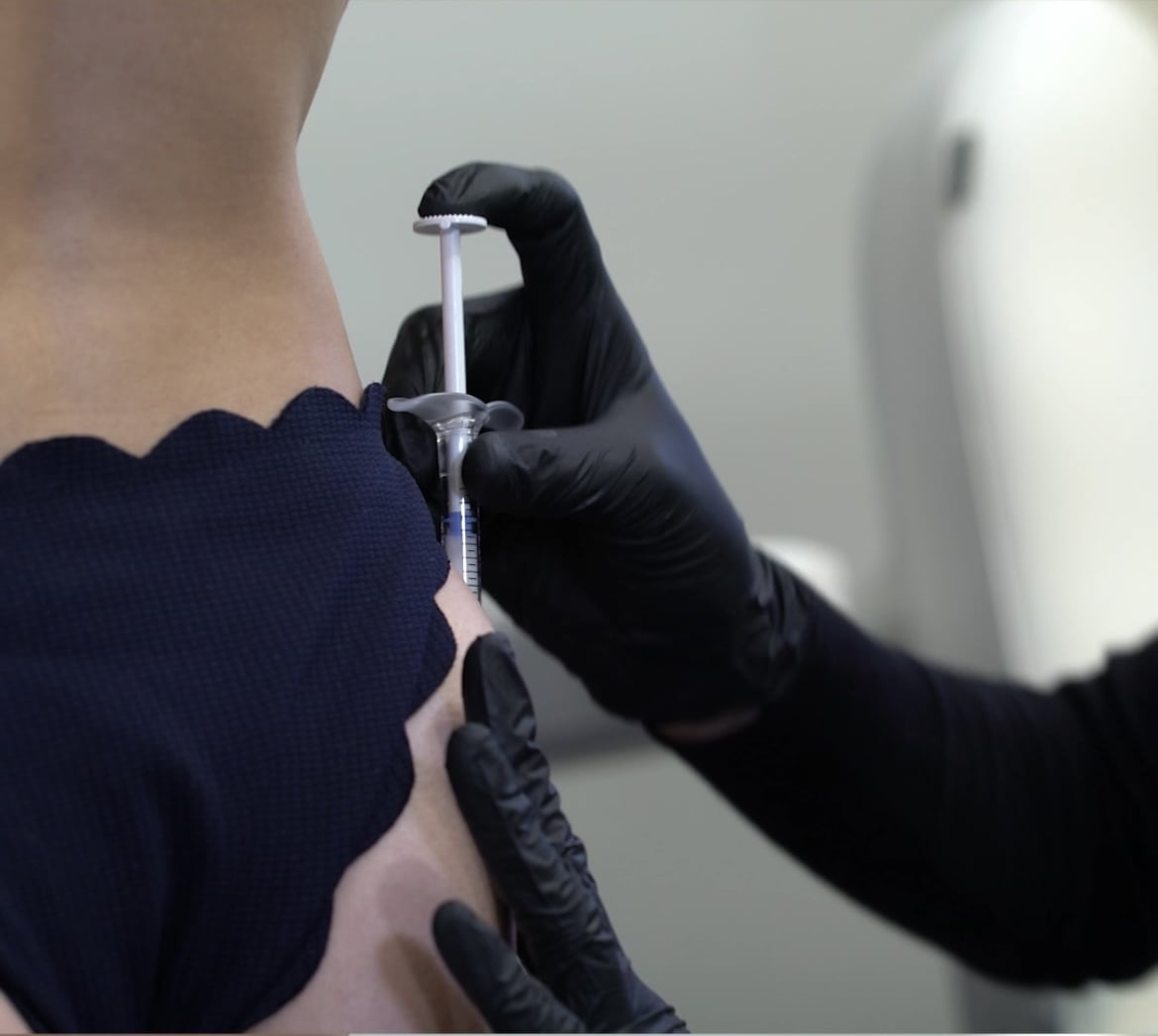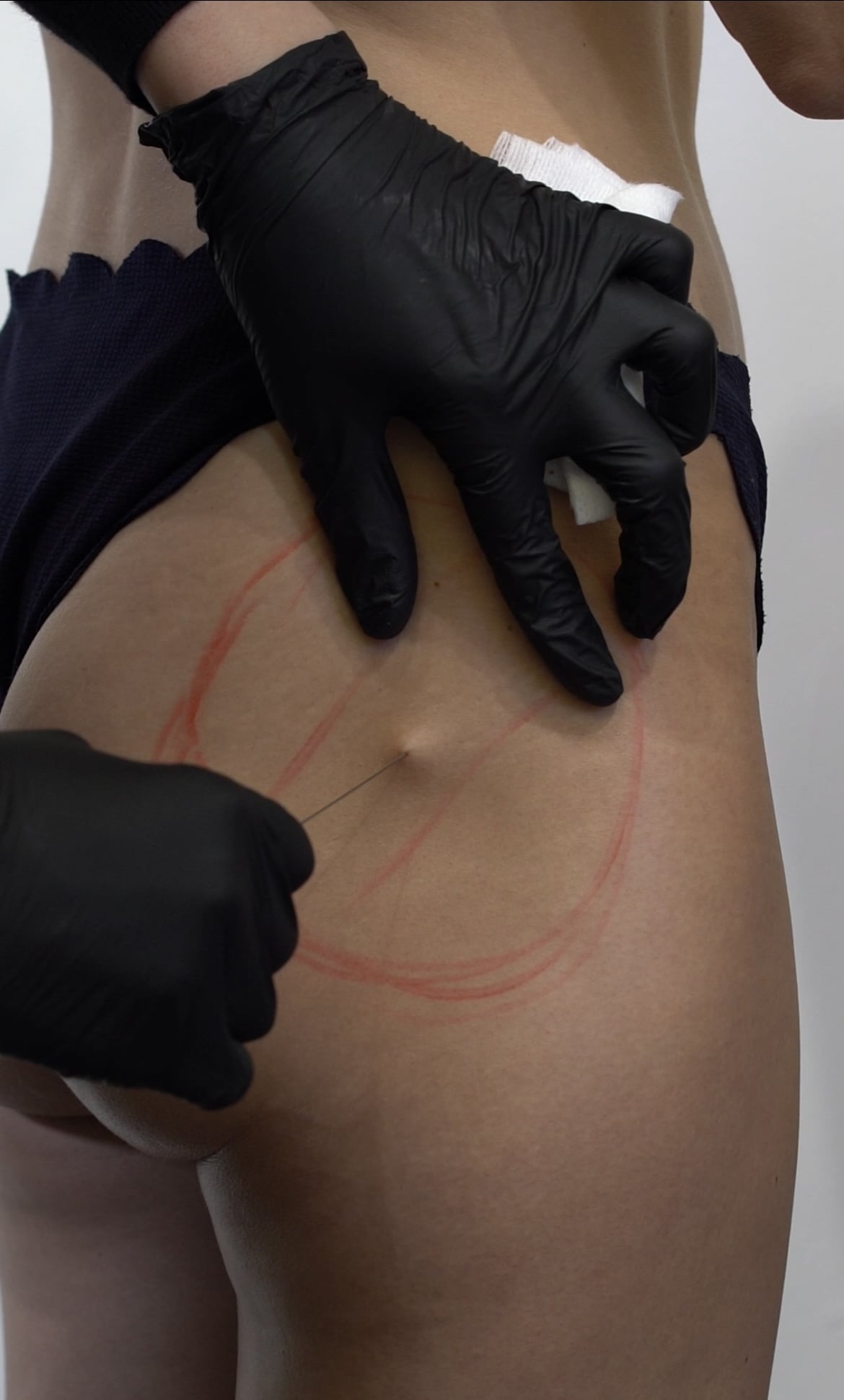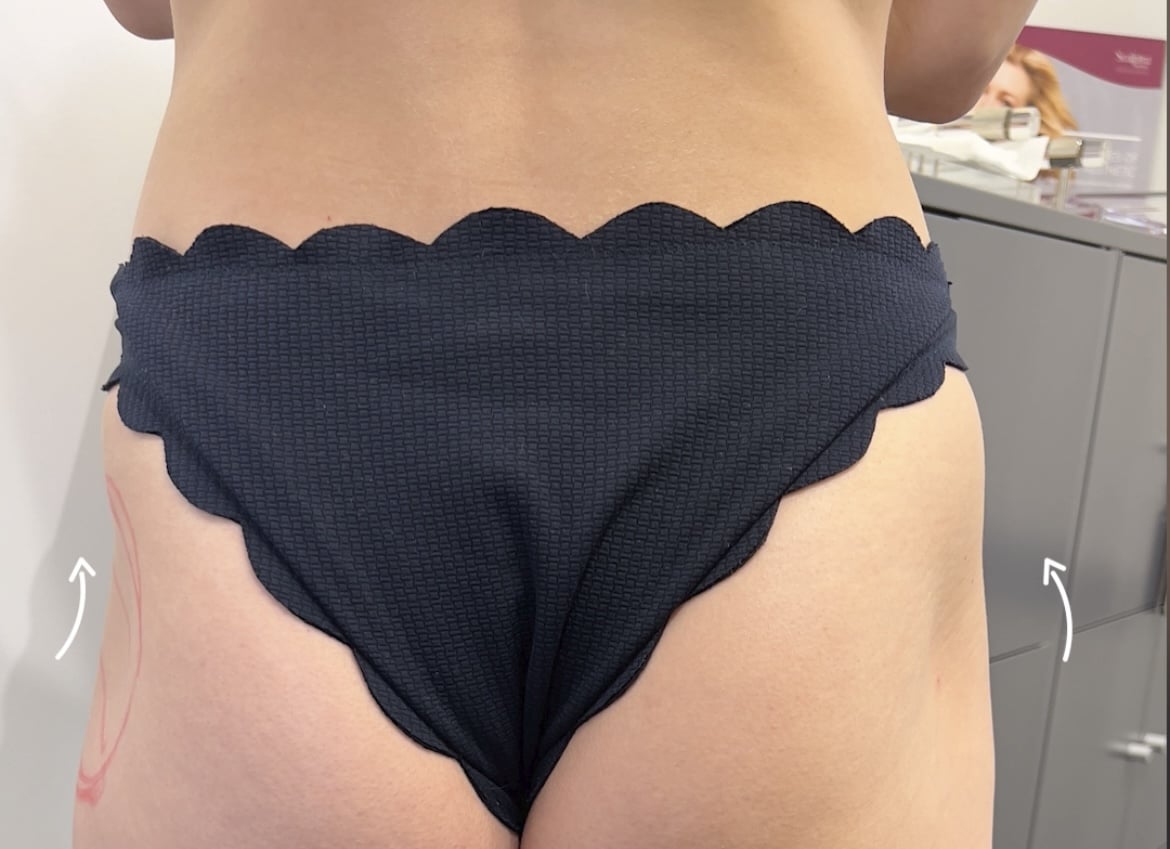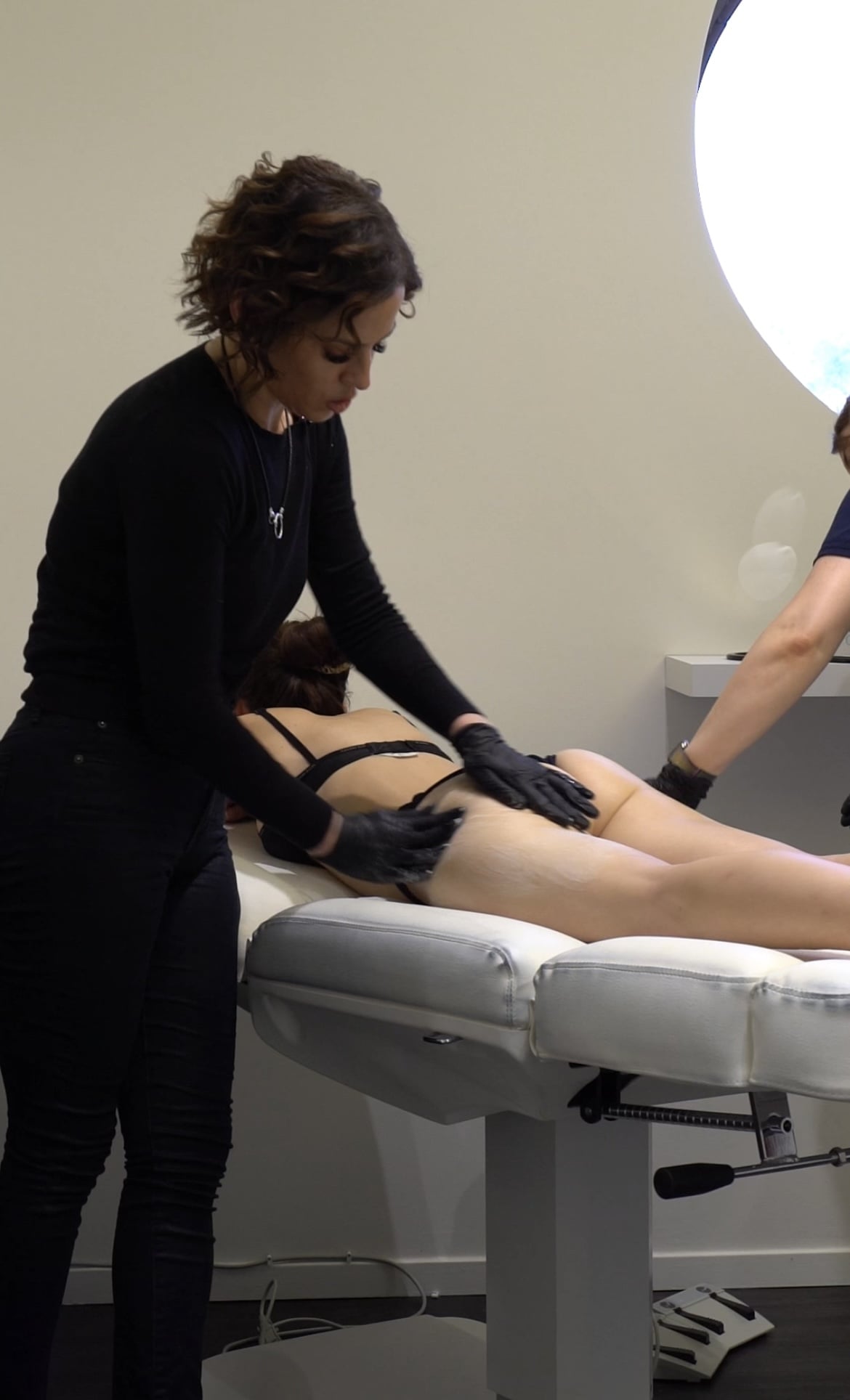I Got Butt Injections to Treat My Hip Dips — Here's What to Know
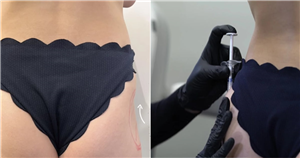
I remember the exact moment that I decided to invest in my tush: I was eyeing an eyelet bikini from the line Juillet, realizing that I wouldn’t be comfortable rocking the adorably cheeky Chloe bottoms publicly. I’ve always had an athletic body type, so it surprises my friends when I tell them I am self-conscious about my butt. The truth is, it’s been years since I’ve felt comfortable in my bikini bottoms, compounded by two years of a COVID-induced, stationary lifestyle that interrupted my regular yoga schedule.
With the summer season upon us, it felt like the appropriate time to get proactive with my booty-enhancing goals, just to give my self-esteem a little bikini-season boost. I started applying the One Ocean Bioactive Body Sculpting Marine Cream ($125), a cruelty-free lotion with active ingredients that claim to help improve definition and silhouette. But I’m also willing to do the work, so I began using my elliptical on an incline and reached out to the actor and fitness coach Alex Prange for his favorite firming exercises for the glutes. Then I looked to the beauty industry for in-office treatments.
As a beauty editor, I was open to trying what the experts recommend aside from the surgical Brazilian butt lift (BBL) procedure, which goes beyond my budget. Over the course of several months, I had a session of EmSculpt Neo for buttocks — an FDA-approved device for lift and tone that claims to be the equivalent of 20,000 squats — and tried out InMode EvolveX, both of which require repeated sessions for full results. I then set my sights on butt injections, otherwise known as a nonsurgical butt augmentation.
What Is a Nonsurgical Butt Augmentation?
This isn’t the type of filler that’s used in the face. This in-office procedure entails injecting biostimulatory filler that works gradually by cuing the body’s own collagen production. When injected in the face, biostimulatory filler (like Sculptra or Radiesse) is used in its most potent form and placed deep and close to the bone. This depth of injection is to prevent any nodules of scar tissue from forming at the surface. (After all, as board-certified plastic surgeon Ben Talei, MD, points out, scar tissue is collagen, too.)
When injected in the body, on the other hand, the injector prepares it in a diluted form to help it disperse for a more expansive, gradual effect that also decreases the likelihood of nodules. It’s then injected in the deep dermis and upper-subcutaneous layers.
Board-certified dermatologist Corey L. Hartman, MD, confirms he has seen an increase in interest of late among his patients for treating hip dips and buttock irregularities with this class of injectable. “People are definitely focusing on that area, I think because of the BBL craze,” he says. “I just like to remind them that we aren’t there to augment significantly. We are there to fill in gaps of what’s been lost and smooth it out. They get a little rounder perhaps, but not huge.” He adds that it’s also great for skin texture — not so much for stretch marks but for helping to smooth out dimpling.
My Experience Getting Butt-Augmentation Injections
Because that fit the bill of what I was looking for — I wasn’t looking to augment in size, per se, but rather to help lift and rejuvenate what I’ve already got — I decided to go to physician’s associate and celebrity injector Cheyanne, founder of The Private Suite in Los Angeles, who specializes in using biostimulatory fillers. For the hip dips and buttocks, which obviously have a greater surface area to cover than the face, she opts for hyperdiluted (HD) Radiesse, a product whose effects impart some immediate volume that she has likened to “glossing.” As Dr. Hartman explains, Radiesse itself arrives in a pasty form that’s reconstituted at its preferred dilution using saline for larger areas of the body like the knee caps and hip dips.
At my consult, Cheyanne told me that I was an ideal candidate because I’m young and fit, meaning that the skin cells’ fibroblasts (which create structural proteins like collagen and elastin) are still more active. However, she warned that because I have deep hip dips, it would likely take me multiple costly sessions to see full results and the smoothed, lifted silhouette I craved. “Hip dips are genetic,” she says, “which means that you cannot address them with exercise.”
First, we took photos and analyzed them, with her showing me how the added collagen in my hip dips would provide the lifted effect I was seeking in the general cheek zone. But this would take time and patience; each treatment takes eight weeks for its full results to appear, at which point I could head in for the next session.
Then we got started. She marked the areas on my hip dips that she would be injecting and organized the 16 vials of product that would fill the region. (For reference, only two vials are used for an entire “liquid facelift” in the face.) The first four to six pricks were to insert a microcannula, which is a thin, flexible, hollow tube that works kind of like a straw for dispensing the product. It looks scary to watch, but experientially, you go numb shortly after the product starts flowing due to the lidocaine in the formula.
Once we finished one side, we moved onto the next. I stood for the treatment, then lied down on my stomach for a five-minute butt massage. Cheyanne told me to massage the area for five minutes, five times per day, for the first week. And that was it.
Aftercare For a Nonsurgical Butt Augmentation
That night and the entire next day, I was very sore. I kept waking myself up during the night any time I inadvertently rolled onto my side — and I’m normally a side sleeper. I even canceled brunch the next day and stayed home to use my Celluma Pro panel for the anti-inflammatory and healing effects of red-light therapy. The pain improved significantly by day two, and I was able to get back to my workouts. By day three, the pain was completely gone. There was also a faint hint of bruising and a mark from the needle, but nothing that anyone would see, that disappeared entirely in just a few days. Now, I wait for my next session.
If you’re considering this procedure, there are a few things to know. The key with using a biostimulatory filler for hip dips is knowing what to expect and having the patience (and budget) to get there. As mentioned, each session takes eight weeks for the collagen to grow, so your injector should help manage your expectations for gradual results. “Again, you don’t necessarily want to create volume,” Dr. Hartman says. “You just want to smooth it all out.” Board-certified dermatologist Caren Campbell reiterates that the changes will be subtle and require a lot of vials of product. Because of this, she frequently uses Sculptra for liquid facelifts but actually refers those seeking volume for hip dips to a plastic surgeon. It worked for me because I’m not looking for added projection — just a little added collagen in the right areas to soften my hip dips and provide overall lift.
Injectables may seem extreme to some, but with my job’s exposure to aesthetic and cosmetic treatments, these procedures are both fascinating and becoming more normalized. The option to give this type of treatment a try as part of my own butt-boosting goals felt like a great option for ameliorating some of my body insecurities.
Definitions of beauty are highly personal. This all started with something that my friends see as inconsequential but that really bothers me. Without making any sort of normative claim on others, you can choose to give your skin or body a cosmetic treatment entirely for yourself. (Trust that I will not be flaunting my bum in front of others at any point in the foreseeable future.) Speaking personally, addressing this insecurity will make a big difference in my own confidence levels poolside, and I can hardly wait to see my results.
Source: Read Full Article
